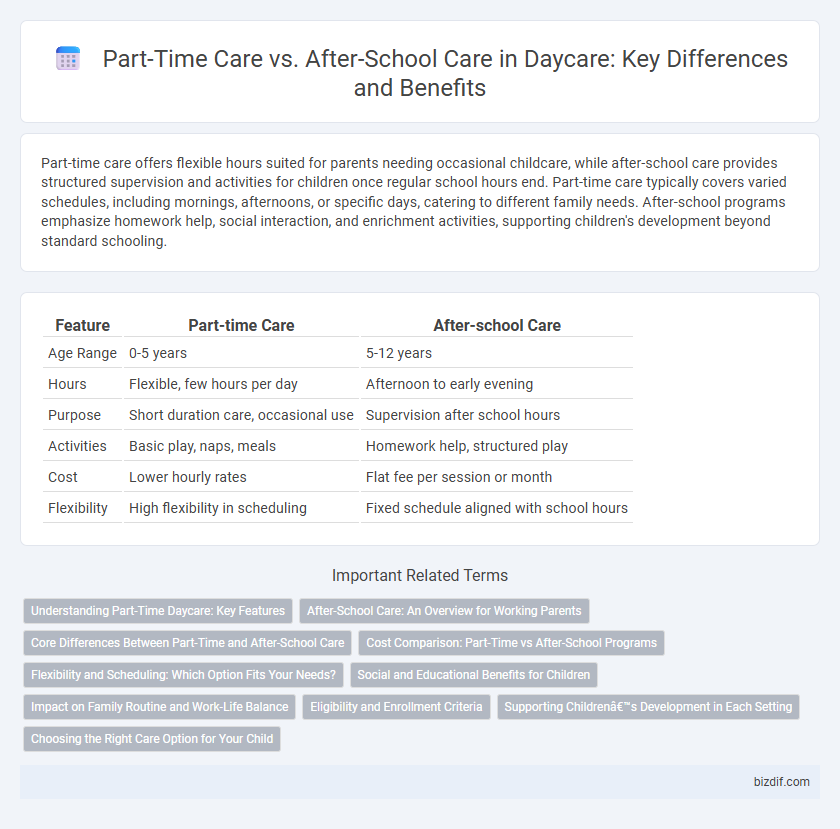Part-time care offers flexible hours suited for parents needing occasional childcare, while after-school care provides structured supervision and activities for children once regular school hours end. Part-time care typically covers varied schedules, including mornings, afternoons, or specific days, catering to different family needs. After-school programs emphasize homework help, social interaction, and enrichment activities, supporting children's development beyond standard schooling.
Table of Comparison
| Feature | Part-time Care | After-school Care |
|---|---|---|
| Age Range | 0-5 years | 5-12 years |
| Hours | Flexible, few hours per day | Afternoon to early evening |
| Purpose | Short duration care, occasional use | Supervision after school hours |
| Activities | Basic play, naps, meals | Homework help, structured play |
| Cost | Lower hourly rates | Flat fee per session or month |
| Flexibility | High flexibility in scheduling | Fixed schedule aligned with school hours |
Understanding Part-Time Daycare: Key Features
Part-time daycare offers flexible hours tailored to parents needing care for a few hours daily or specific days of the week, making it ideal for irregular work schedules or short-term commitments. This type of care typically includes structured activities, nap times, and meals, similar to full-time daycare but on a reduced schedule. Understanding part-time daycare involves recognizing its balance between affordability and convenience, providing essential early childhood development support without the full-day commitment of after-school care programs.
After-School Care: An Overview for Working Parents
After-school care provides structured supervision and enrichment activities for children once the school day ends, catering specifically to working parents with variable schedules. It often includes homework assistance, recreational play, and social interaction, helping children transition smoothly from school to home. This type of care supports working families by ensuring children remain engaged and safe during critical hours.
Core Differences Between Part-Time and After-School Care
Part-time care typically offers flexible hours during the day for younger children who attend daycare intermittently, while after-school care is structured specifically for school-age children needing supervision and enrichment from school dismissal until parents return. Part-time care often emphasizes early childhood development activities and naps, whereas after-school programs focus on homework assistance, social interaction, and recreational activities. Cost models also differ, with part-time care billed hourly or by session and after-school care usually offered as a fixed weekly or monthly rate.
Cost Comparison: Part-Time vs After-School Programs
Part-time daycare programs generally cost less per hour than after-school care due to their shorter duration and flexible scheduling. After-school care often includes additional services like homework help and extracurricular activities, which can increase the overall fees. Families should evaluate hourly rates and included amenities when comparing the cost-effectiveness of part-time versus after-school care options.
Flexibility and Scheduling: Which Option Fits Your Needs?
Part-time care offers greater flexibility for parents needing irregular or limited hours, making it ideal for non-traditional work schedules or occasional coverage. After-school care typically follows a fixed schedule aligned with school hours, providing consistent supervision and structured activities for school-aged children. Choosing between these options depends on your child's age, your daily routine, and the level of predictability required for your family's schedule.
Social and Educational Benefits for Children
Part-time care programs provide children with structured social interactions and early educational activities that enhance cognitive development and peer relationships. After-school care offers extended opportunities for homework assistance, extracurricular enrichment, and social skill-building in a supervised environment. Both care models support emotional growth and academic success by fostering routine, collaboration, and age-appropriate learning experiences.
Impact on Family Routine and Work-Life Balance
Part-time care offers flexibility that can accommodate varied work schedules, reducing stress and allowing parents to manage errands or appointments during the day. After-school care provides a structured environment post-school hours, helping families maintain consistent routines and facilitating smoother transitions between work commitments and family time. Both options play a significant role in enhancing work-life balance by addressing different needs in daily family routines.
Eligibility and Enrollment Criteria
Part-time care eligibility often caters to families seeking flexible schedules, with enrollment criteria typically requiring proof of work or study commitments and availability on selected days. After-school care enrollment prioritizes school-age children, mandating school attendance verification and adherence to specific pickup times aligned with school hours. Both programs may require vaccination records and emergency contact information for enrollment completion.
Supporting Children’s Development in Each Setting
Part-time care offers tailored activities that promote social skills and cognitive growth through structured play and early learning routines. After-school care supports academic progress and emotional development by providing homework assistance, enrichment programs, and peer interaction in a safe environment. Both settings enhance children's development by addressing individual needs at different times of the day, fostering well-rounded growth.
Choosing the Right Care Option for Your Child
Selecting the appropriate care option depends on your child's age, schedule, and developmental needs. Part-time care suits younger children or those needing occasional supervision, offering flexible hours during weekdays. After-school care benefits school-aged children by providing structured activities, homework support, and social interaction until parents return from work.
Part-time care vs After-school care Infographic

 bizdif.com
bizdif.com